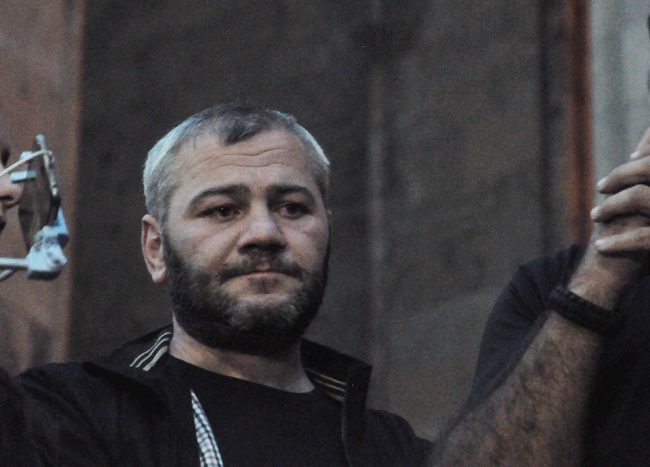
Police in Georgia have arrested the father of 16-year-old David Saralidze, who was murdered outside a school in Tbilisi in December. Zaza Saralidze, who has been protesting continuously for months, tried to prevent police from dismantling a tent outside parliament.
On Friday, police attempted to prevent Saralidze from covering mattresses from the rain in front of Tbilisi’s Parliament building on Rustaveli Avenue.
He has been camped outside the building almost continuously for the past five months, protesting what he says is a government cover-up of a mishandled investigation into his son’s murder.
Saralidze attacked police with a tent pole while trying to prevent them from taking the tent away.
According to the Interior Ministry said he continued to assault police officers inside an ambulance which was taking him away. Two other men were also detained for resisting police.
On Friday afternoon, Saralide remained in hospital. He faces a possible 4–7 years in prison if charged and convicted.
Giorgi Chitidze, a lawyer at the Open Society — Georgia Foundation, posted on Facebook on Friday that restricting Saralidze’s right to set up a tent was unlawful, and so his response did not constitute a violent act against a protector of public order.
A ‘coordinator of the United National Movement’
As the incident unfolded, the head of the ruling Georgian Dream Party, Bidzina Ivanishvili, was speaking with journalists. Ivanishvili slammed government critics for comparing the Khorava Street murders scandal to the case of Sandro Girgvliani.
Girgvliani was killed in January 2006, allegedly following an argument with then–Interior Minister Vano Merabishvili’s wife, Tako Salakaia, and accompanying state security officers.
‘Isn’t [this comparison] immoral? Then, the state killed Girgvliani and covered for the killers for years’, insisted Ivanishvili during the interview.
In 2011, the European Court of Human Rights ruled the investigation into Girgvliani’s murder, under the then–ruling United National Movement (UNM) party, as ‘lacking impartiality’ and ‘objectivity’.
In January, Tbilisi City Court found former President Mikheil Saakashvili guilty of abusing his office in order to help the law enforcement officers convicted of Girgvliani’s murder. A Georgian court sentenced Saakashvili to 3 years in prison in absentia.
In his live interview, Ivanishvili ‘once again’ expressed his condolences for Saralidze’s loss, but quickly called his continued protests against the authorities and setting up a tent on Rustaveli Avenue as the actions of a ‘coordinator of the United National Movement keeping a spot’ for anti-government forces.
Police previously forbade Saralidze from setting up a tent on Rustaveli Avenue on 26 September, prompting 16 Georgian rights groups to release a joint statement calling it a violation of his constitutional right to free assembly.
Ivanishvili said the government had ‘done everything in this case — the Chief Prosecutor [Irakli Shotadze] resigned, even though it was not necessary’.
‘There is no need for a street [protest]’, he added, urging people to wait for the renewed investigation into the murder to conclude.
Georgian Justice Minister Tea Tsulukiani was among the few Georgian Dream leaders to openly insist throughout the year that the chief prosecutor was not responsible for the prosecution’s failure in court.
On 31 May, Tbilisi City Court acquitted two teenagers of killing Davit Saralidze, a ruling which reinforced his father’s claims that the investigation was ‘jeopardised’ by evidence tampering and witness intimidation.
Shotadze resigned immediately after the verdict, but mass protests continued for 12 days.
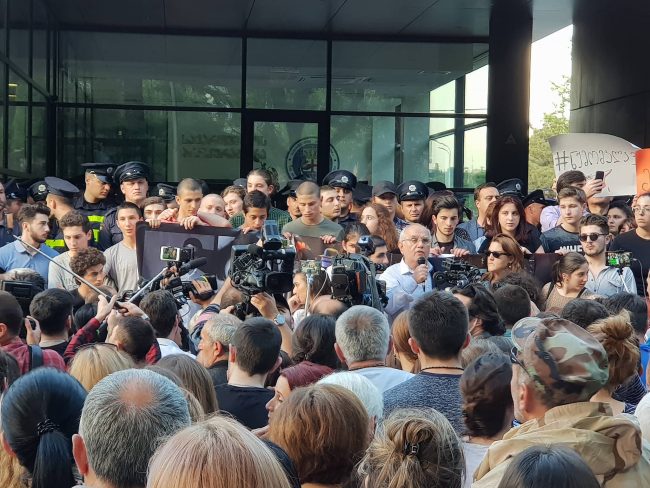
As the demonstrations continued, the Interior Ministry, which took over the investigation from the Prosecutor’s Office, arrested Mirza Subeliani, a former official at the Prosecutor’s Office, charging him over ‘failure to report a crime’.
Saralidze had insisted since the early days of the investigation that Subeliani was behind a cover-up.
In early July, the ruling party agreed to establish a Parliamentary Investigative Commission to look into the case led by the opposition European Georgia Party.
After two months, the commission concluded that the investigation was compromised in order to protect Mirza Subeliani and his relatives.
In their 67-page conclusion, the commission accused former Chief Prosecutor Irakli Shotadze of either ‘negligence’ or ‘abuse of power’, and also found Interior Minister Giorgi Gakharia and Justice Minister Tea Tsulukiani ‘politically responsible’ for the mishandled investigation.
While President Giorgi Margvelashvili, opposition parties, rights groups, and the Public Defender called on the government to address flaws in the investigation uncovered by the commission, Georgian Dream leaders dismissed its findings as ‘politically biased’, and the investigation has stalled since.
In his highly-watched first televised interview with journalists after the Khorava Street murder protests, Ivanishvili said the case had only gone through the first instance of court, and urged the public to wait for the end of the renewed investigation.
Mass protests
Mass protests led by Saralidze began before the 31 May Tbilisi Court ruling, with thousands of protesters blocking Tbilisi’s central Rustaveli Avenue on 27 May.
Saralidze was joined by Malkhaz Machalikashvili, the father of a 19-year-old Temirlan Machalikashvili, who was killed by Georgian security forces during a special operation in the Pankisi Valley in November.
Machalikashvili has joined Saralidze in camping outside parliament.
[Read on OC Media: Questions in Pankisi after Georgian Security Services kill teen]
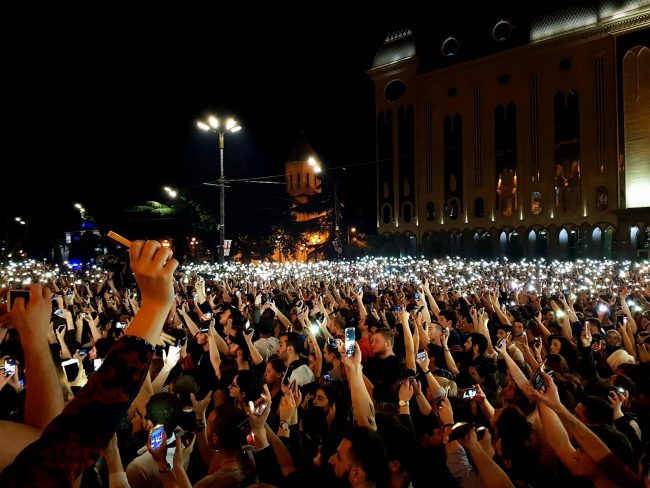
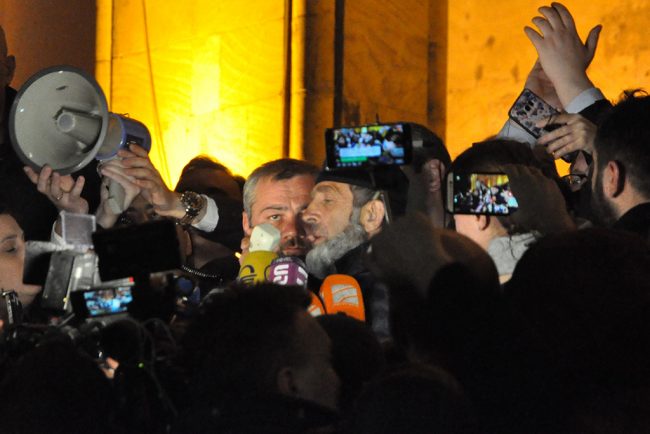
Several opposition parties, including the UNM, and opposition-leaning TV station Rustavi 2, also supported the demonstrations.
However, Saralidze and Machalikashvili later distanced themselves from political parties involved in their rallies.
On 14 June, police dispersed participants of a protest strengthened by UNM supporters.
Since then Saralidze and Machalikashvili have struggled to revive their protests, with their September ‘Fathers for Truth’ campaign bringing fewer than a dozen people to the streets.
The Subeliani Tapes
During 14–20 September, Rustavi 2 aired a series of ‘secret recordings’ from prison involving conversations allegedly between Mirza Subeliani, the former official charged over the investigation, with Georgian Dream MP Viktor Japaridze and others.
In the tapes, Subeliani alleged he had made a deal with the authorities to take the fall for the government, but said that the agreement had not been respected and threatened the ruling party with ‘terabytes of kompromat’ on leading current and former officials.
[Understand the Subeliani tapes scandal with Analysis by OC Media: Georgia’s tapes scandals suggest something is rotten at the top of Georgian politics]
Subeliani allegedly expresses anger in the tapes over testimonies he and former Tbilisi Prosecutor Mikheil Shakulashvili gave to the parliamentary commission into the investigation.
The commission questioned Subeliani on 22 July in prison, while Shakulashvili was questioned a day later, giving contradictory testimony.
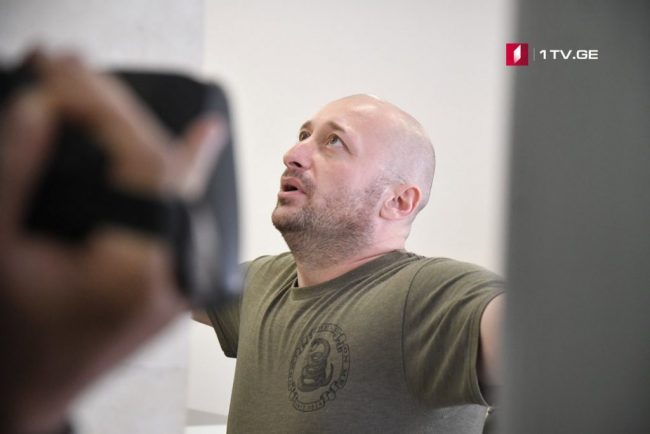
After the release of first tapes, Saralidze said his claims had been vindicated and said the ‘whole government is full of killers’.
In response, the authorities claimed Subeliani was unstable, and hence not credible. They insisted Subeliani was still being prosecuted despite his threats.
Members of the ruling Georgian Dream party as well as the Prosecutor’s Office have insisted that Subeliani’s claims were ‘fabricated stories’, which were staged, recorded, and leaked by an outside party.
The party has consistently pointed to the opposition United National Movement party.
On 18 October, Interior Minister Giorgi Gakharia assured the public that the authorities knew by who and how the recordings were arranged and planned ‘in detail’, but since any ‘legal response’ would likely be attributed to the pre-election campaign, promised specific steps after October’s presidential election.




 26 October 2018
26 October 2018


